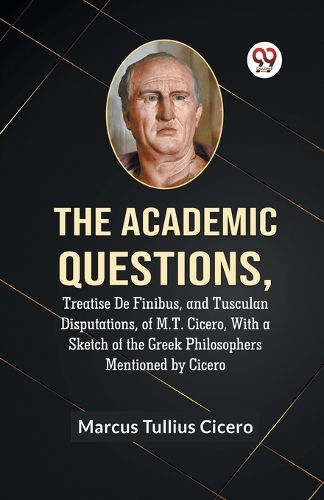Readings Newsletter
Become a Readings Member to make your shopping experience even easier.
Sign in or sign up for free!
You’re not far away from qualifying for FREE standard shipping within Australia
You’ve qualified for FREE standard shipping within Australia
The cart is loading…






This title is printed to order. This book may have been self-published. If so, we cannot guarantee the quality of the content. In the main most books will have gone through the editing process however some may not. We therefore suggest that you be aware of this before ordering this book. If in doubt check either the author or publisher’s details as we are unable to accept any returns unless they are faulty. Please contact us if you have any questions.
"The Academic Questions," written through the renowned Roman philosopher and statesman Marcus Tullius Cicero, is a widespread work within the discipline of ancient philosophy. Composed inside the shape of a speak, this philosophical treatise explores the tenets of the Academic school of concept, which Cicero himself championed. Cicero's work, dependent as a talk amongst diverse characters, commonly specializes in the arguments and perspectives of the skeptical Academy, a faculty of philosophy founded by means of Arcesilaus and later delicate through Carneades. The vital subject matter of the textual content revolves around the query of how you will acquire know-how and the character of certainty. Cicero examines the epistemological demanding situations posed with the aid of skepticism and explores the competing thoughts inside Academic philosophy concerning what can in reality be known. The communicate is likewise marked by way of its engagement with current philosophical debates, addressing troubles which include the reliability of the senses and the position of cause in forming beliefs. Cicero's paintings serve as a bridge between Greek and Roman philosophical traditions, making Greek philosophy available to a broader Roman target audience. "The Academic Questions" is splendid for its erudition, its function in retaining and transmitting Greek philosophical notion, and its affect on later Western philosophy.
$9.00 standard shipping within Australia
FREE standard shipping within Australia for orders over $100.00
Express & International shipping calculated at checkout
This title is printed to order. This book may have been self-published. If so, we cannot guarantee the quality of the content. In the main most books will have gone through the editing process however some may not. We therefore suggest that you be aware of this before ordering this book. If in doubt check either the author or publisher’s details as we are unable to accept any returns unless they are faulty. Please contact us if you have any questions.
"The Academic Questions," written through the renowned Roman philosopher and statesman Marcus Tullius Cicero, is a widespread work within the discipline of ancient philosophy. Composed inside the shape of a speak, this philosophical treatise explores the tenets of the Academic school of concept, which Cicero himself championed. Cicero's work, dependent as a talk amongst diverse characters, commonly specializes in the arguments and perspectives of the skeptical Academy, a faculty of philosophy founded by means of Arcesilaus and later delicate through Carneades. The vital subject matter of the textual content revolves around the query of how you will acquire know-how and the character of certainty. Cicero examines the epistemological demanding situations posed with the aid of skepticism and explores the competing thoughts inside Academic philosophy concerning what can in reality be known. The communicate is likewise marked by way of its engagement with current philosophical debates, addressing troubles which include the reliability of the senses and the position of cause in forming beliefs. Cicero's paintings serve as a bridge between Greek and Roman philosophical traditions, making Greek philosophy available to a broader Roman target audience. "The Academic Questions" is splendid for its erudition, its function in retaining and transmitting Greek philosophical notion, and its affect on later Western philosophy.